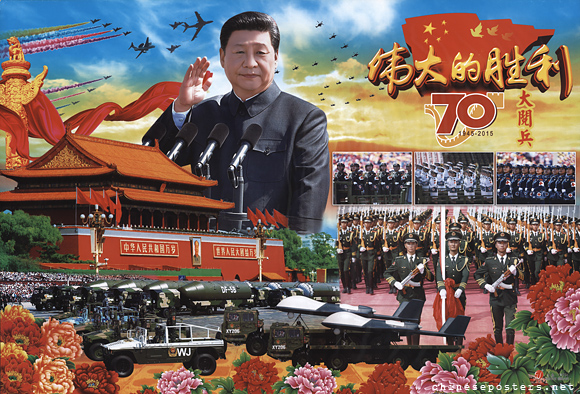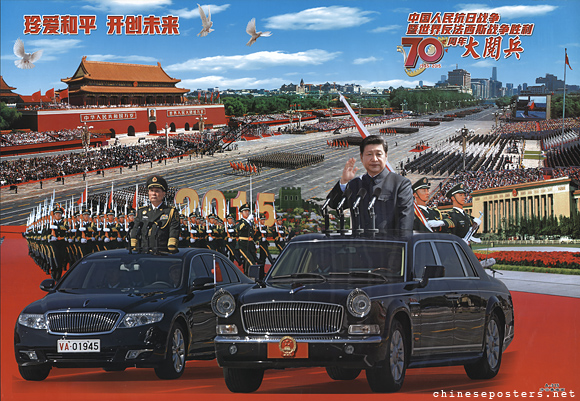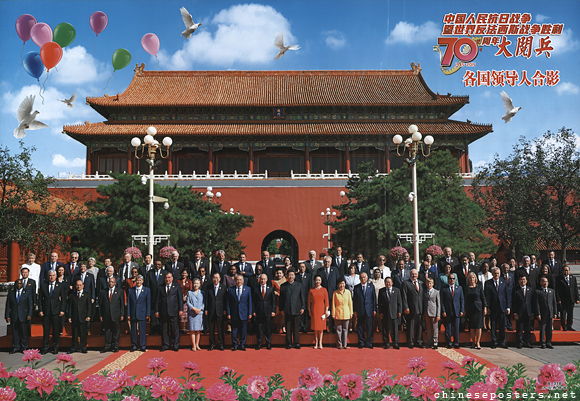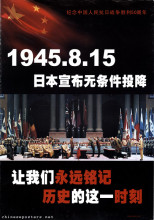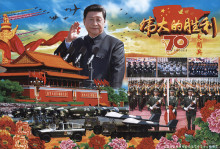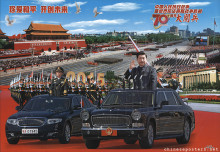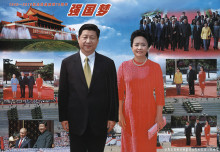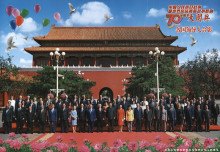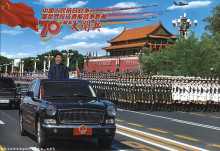Great victory -- Great military parade, 2015
On 3 September 2015, the China Victory Day parade, a military parade along Chang'an Avenue, Beijing, was held to celebrate the 70th anniversary of the Victory over Japan Day, formally ending World War II. Some 12,000 troops of the People's Liberation Army participated in the parade, as well as over 1,000 troops from 17 different countries (from Afghanistan, Belarus, Cambodia, Cuba, Egypt, Fiji, Kazakhstan, Kyrgyzstan, Laos, Mexico, Mongolia, Pakistan, Serbia, Tajikistan, Vanuatu, Venezuela, and Russia). It was the first major parade since Xi Jinping took power as the General Secretary of the CCP in 2012. For the event, numerous businesses, factories, and mines had been ordered to stop operations in order to ensure blue skies for the inspection of the troops.
Cherishing peace, creating the future, 2015
Xi was the central figure of the day's events. Premier Li Keqiang was the master of ceremonies for the parade. Atop Tian'anmen Gate, Xi wore a Sun Yat-sen suit, as is customary for leaders inspecting troops at military parades; his wife Peng Liyuan wore a red dress. The remaining political figures wore business suits. Xi delivered the keynote address at the parade with an unexpected announcement of a plan to cut 300,000 personnel from the Chinese military. The other members of the Politburo Standing Committee (Zhang Dejiang, Yu Zhengsheng, Liu Yunshan, Wang Qishan, and Zhang Gaoli) watched the parade on top of Tian'anmen Gate. Former paramount leaders Jiang Zemin and Hu Jintao; former Premiers Li Peng, Zhu Rongji and Wen Jiabao; and other former senior leaders Li Ruihuan, Wu Bangguo, Jia Qinglin, Li Lanqing, Song Ping, Zeng Qinghong, Wu Guanzheng, Li Changchun, Luo Gan, and He Guoqiang, also attended the parade at Tian'anmen Gate.
Group photo with various world leaders, 2015
Many foreign dignitaries attended, although few major world leaders, former wartime allies, were present. They included: Minister for Veterans' Affairs Michael Ronaldson of Australia; President Alexander Lukashenko of Belarus; Chairman of the Presidency Dragan Čović of Bosnia and Herzegovina; King Norodom Sihamoni of Cambodia; First Vice President Miguel Díaz-Canel of Cuba; President Miloš Zeman of the Czech Republic; President Joseph Kabila of the Democratic Republic of the Congo; Member of the Politburo Presidium Choe Ryong-hae of North Korea; President Abdel Fattah el-Sisi of Egypt; Foreign Minister Laurent Fabius of France; Chief Executive Leung Chun-ying of Hong Kong; Minister of Foreign Affairs Péter Szijjártó of Hungary; Foreign Minister Paolo Gentiloni of Italy; President Nursultan Nazarbayev of Kazakhstan; President Almazbek Atambayev of Kyrgyzstan; President Choummaly Sayasone of Laos; Chief Executive Fernando Chui of Macau; President Tsakhiagiin Elbegdorj of Mongolia; President Thein Sein of Myanmar; Minister of State Herman Tjeenk Willink of the Netherlands; President Mamnoon Hussain of Pakistan; President Mahmoud Abbas of Palestine; President Vladimir Putin of Russia; President Park Geun-hye of South Korea; President Tomislav Nikolić of Serbia; President Jacob Zuma of South Africa; President Omar al-Bashir of Sudan; Deputy Chair of Junta Prawit Wongsuwan of Thailand; President Emomali Rahmon of Tajikistan; President Islam Karimov of Uzbekistan; Ambassador Max Baucus of the United States; Prime Minister Sato Kilman of Vanuatu; President Nicolás Maduro of Venezuela; and President Trương Tấn Sang of Vietnam.
Also invited to attend were leaders that in the past had dealings with China: Former Chancellor Gerhard Schröder of Germany; Former Prime Minister Tony Blair of the United Kingdom; Former Prime Minister Tomiichi Murayama of Japan; Former President Joseph Estrada of the Philippines; Former Deputy Prime Minister Wong Kan Seng of Singapore; Former Vice President and Premier Lien Chan of the Republic of China (Taiwan); and Former President José Ramos-Horta of East Timor.
Finally, Director-General Irina Bokova of the UNESCO; Secretary-General Ban Ki-moon of the United Nations; and President Peter Maurer of the International Committee of the Red Cross also were present.
In addition, many embassies around Beijing sent their defense attaches and military generals to attend the parade.
"Full text: Xi's speech at commemoration of 70th anniversary of war victory", ChinaDaily.com, 3 September 2015
Vincent K.L. Chang, "Recalling Victory, Recounting Greatness: Second World War Remembrance in Xi Jinping’s China", The China Quarterly 2021, 1152-1173
Alan Taylor, "China Stages a Massive Military Parade to Commemorate the End of World War II", The Atlantic, 3 September 2015
Mo Tian, "The Legacy of the Second Sino-Japanese War in the People’s Republic of China: Mapping the Official Discourses of Memory", The Asia Pacific Journal 20:11:4 (2022)
Hans van de Ven, "The 70th Anniversary of Japan’s surrender", The Asia Dialogue, 2 September 2015
